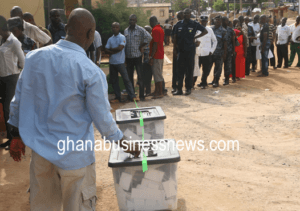ILGS Survey projects 67% turnout in upcoming referendum
 A survey report released by the Institute of Local Government Studies (ILGS), has projected a 67 per cent voter turnout in the December 17 District Level Election and referendum on the election of Metropolitan, Municipal and District Chief Executives (MMDCEs).
A survey report released by the Institute of Local Government Studies (ILGS), has projected a 67 per cent voter turnout in the December 17 District Level Election and referendum on the election of Metropolitan, Municipal and District Chief Executives (MMDCEs).
The 24-page report, which was conducted by the ILGS revealed that among the 67 per cent of registered voters, 75 per cent indicated they would vote “Yes”, while 12 per cent said they would vote “No”.
However, 13 per cent of the subjects refused to disclose their voting preference.
The study, which was conducted between 6-11, November 6th in all the 16 regions, showed that seven out of the regions have ‘Yes’ votes above 75 per cent threshold to amend Article 55(3) of the 1992 Constitution.
The study had a sample size of 6,550 out of 16,845,364 registered voters from six metropolis, 18 municipalities and 20 Districts (totaling 44 MMDs) across the 16 regions.
Bono East and Oti Regions had the highest expected ‘Yes’ vote (93 per cent and 92 per cent respectively). While Northern and Central regions have the least ‘Yes’ votes (55 per cent and 66 per cent respectively).
The finding also noted that the regions with the highest citizen’s awareness about the referendum were North East (83 per cent) and Central (77 per cent), while the lowest were Eastern (53 per cent) AND Ashanti (57 per cent).
Speaking at a News briefing in Accra, Dr Nicholas Awortwi, Director of ILGS said in all, 66 per cent of registered voters claimed to be aware of the referendum on December 17.
He noted that however, only 54 per cent could explain that the referendum was about amendment of Article 55(3) of the constitution, whereas, 43 per cent of the respondents misconstrued the referendum to mean election of MMDCEs, Assembly and Unit Committee Members, while only three per cent had ‘no idea’ what the referendum was about.
Dr Awortwi said with regards to political parties’ strongholds and their preferences, the poll did not show strong significant differences in terms of voters’ preferences for either ‘Yes’ or No’ votes.
He elaborated that in National Democratic Congress (NDC) strongholds, about 73 per cent of registered voters said they would vote ‘Yes’ in the referendum, compared to76 per cent ‘Yes’ votes in New Patriotic Party (NPP) strongholds.
Touching on the recommendations of the report, Dr Awortwi stated that the campaign should focus on explaining the essence of the referendum that is the amendment of Article 55(3), which forbids political parties from participating in local government elections as only 54 per cent could explain that in the survey.
He said the challenge to campaigners was how to explain the essence of the referendum without linking it to the election of MMDCEs because to the voter, the two were inter-related.
“The question of why the Constitutional amendment to Article 55(3) is being proposed cannot be answered succinctly without reference to election of MMDCEs and Assemblymen and women on political party system”, he added.
Dr Awortwi said it was therefore, not surprising that 43 per cent of the respondents misconstrued the referendum to mean election of MMDCEs, Assembly and Unit Committee Members.
He said geographically, Eastern, Ashanti and Western North Regions needed intensive awareness campaign as voters there had the lowest knowledge about the essence of the referendum.
Furthermore, almost half of the people without education had no information on the referendum, it was important that the referendum did not become the preserve of the elites.
Dr Awortwi said the report recommended that awareness creation using drama, skits, songs and other local languages would be needed to enable non-educated people to understand.
Since independence, Ghana has practised deconcentration, a system of decentralisation that enables central government agencies to be diffused to the local level without much decision making powers and resources.
On December 17, Ghanaians will vote in a referendum to decide whether an entrenched clause in the 1992 Constitution (Article 55 (3)) needs to be amended to pave way for political parties in Ghana to participate in the Organisation of local government elections.
The amendment if passed in the referendum is likely to be a game changer. It will shift accountability of political leadership from the centre to the grassroots and enhance greater citizen participation, inclusive democratic governance and development.
Source: GNA
